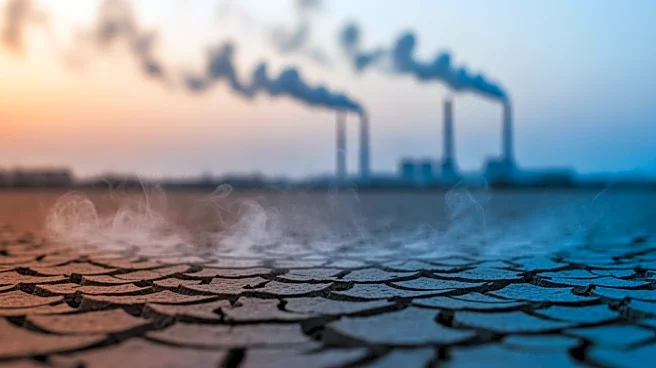What's Happening?
Global fossil fuel emissions are expected to reach their highest levels ever in 2025, according to a recent report. Despite international climate negotiations and advancements in renewable energy, emissions are projected to increase by 1.2% from 2024
to 2025, reaching 37.7 billion tons of CO2. The rise is attributed to increased coal use in Asia, higher oil consumption in transportation, and growing natural gas demand in Europe and North America. Coal remains the largest contributor, accounting for 40% of energy-related emissions. The report highlights regional differences, with Asia contributing over half of global CO2 emissions due to rapid industrial growth and reliance on coal-fired power plants. North America and Europe show mixed trends, with renewable energy growth offset by increased natural gas use during extreme winters.
Why It's Important?
The projected increase in fossil fuel emissions poses significant challenges to global climate goals, particularly the aim to limit temperature rise to 1.5°C above pre-industrial levels. The continued reliance on fossil fuels undermines efforts to reduce greenhouse gas emissions, exacerbating climate risks such as extreme heat waves, glacier melting, and ocean heating. These environmental changes threaten ecosystems, food security, and human health worldwide. The report underscores the need for urgent action to accelerate the transition to renewable energy, electrify transportation, and invest in carbon capture technologies. Failure to address these issues could lead to irreversible climate impacts, affecting economic stability and global health.
What's Next?
To mitigate the rising emissions, the report suggests several urgent actions, including increasing renewable energy capacity, promoting electric vehicles, and investing in carbon capture technologies. Strengthening international climate policies and supporting developing countries in their transition to clean energy are also crucial. The next five years will be pivotal in determining whether the global community can stay within the 1.5°C limit or face severe climate consequences. Policymakers, businesses, and civil society must collaborate to implement these strategies effectively and ensure a sustainable future.
Beyond the Headlines
The report highlights deeper implications of the emissions increase, such as the slow pace of energy transition and the high cost of clean technologies. Many countries face challenges in adopting renewables due to infrastructure lock-in and insufficient funding. Additionally, rapid urbanization and policy delays contribute to the continued reliance on fossil fuels. Addressing these systemic issues requires comprehensive policy reforms and international cooperation to facilitate technology transfer and climate finance for developing nations.















